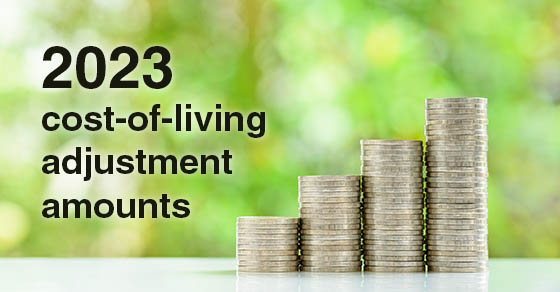What do the 2023 cost-of-living adjustment numbers mean for you? Part one: individual tax

For more than 60 tax provisions, the IRS recently released its cost-of-living adjustment numbers for 2023. Many values increased significantly over 2022 estimates due to the significant increase in inflation this year. Be sure to take these 2023 modifications into account when you put 2022 year-end tax preparation techniques into action.
Remember that the calculations for annual inflation adjustments use the chained consumer price index under the Tax Cuts and Jobs Act (TCJA). You may know it as C-CPI-U. This calculation increases tax-bracket thresholds, the standard deduction, certain exemptions, and other figures at a slower rate than when the consumer price index was in use. This potentially pushes taxpayers into higher tax brackets and making various breaks worth less over time. The C-CPI-U is adopted permanently by the TCJA.
Individual income taxes
For each filing status, the thresholds for the various tax brackets rise; however, because these thresholds are based on percentages, they increase more sharply for the higher brackets. In contrast, the top of the 35% bracket increases by $22,950 to $45,900, depending on filing status. In addition, the top of the 10% bracket rises by $725 to $1,450.
2023 ordinary-income tax brackets:
| Tax rate | Single | Head of household | Married filing jointly or surviving spouse | Married filing separately |
| 10% | $0 – $11,000 | $0 – $15,700 | $0 – $22,000 | $0 – $11,000 |
| 12% | $11,001 – $44,725 | $15,701 – $59,850 | $22,001 – $89,450 | $11,001 – $44,725 |
| 22% | $44,726 – $95,375 | $59,851 – $95,350 | $89,451 – $190,750 | $44,726 – $95,375 |
| 24% | $95,376 – $182,100 | $95,351 – $182,100 | $190,751 – $364,200 | $95,376 – $182,100 |
| 32% | $182,101 – $231,250 | $182,101 – $231,250 | $364,201 – $462,500 | $182,101 – $231,250 |
| 35% | $231,251 – $578,125 | $231,251 – $578,100 | $462,501 – $693,750 | $231,251 – $346,875 |
| 37% | Over $578,125 | Over $578,100 | Over $693,750 | Over $346,875 |
Through 2025, the TCJA suspended personal exemptions. The standard deduction was, however, almost doubled, with annual inflation adjustments through 2025. As a result, the standard deduction will be $27,700 for married couples filing jointly, $20,800 for head-of-household filers, and $13,850 for single filers in 2023. (singles and married couples filing separately). After 2025, standard deduction amounts will drop back to the quantities under pre-TCJA law unless Congress extends the current rules or revises them.
Some taxpayers may be able to compensate for the loss of personal exemptions thanks to changes to the standard deduction. However, it could not benefit people who typically itemized their deductions.
Alternative minimum tax
The alternative minimum tax (AMT) is a distinct tax structure with various rules for different types of income and deductions. You must pay the AMT if your AMT liability is more than your ordinary tax liability.
The AMT tax brackets are yearly inflation-indexed, just as the ordinary tax brackets. So, every filing status except married filing separately will see a $14,600 increase in the threshold for the 28% tax bracket for 2023.
2023 AMT brackets:
| Tax rate | Single | Head of household | Married filing jointly or surviving spouse | Married filing separately |
| 26% | $0 – $220,700 | $0 – $220,700 | $0 – $220,700 | $0 – $110,350 |
| 28% | Over $220,700 | Over $220,700 | Over $220,700 | Over $110,350 |
Additionally included are the exemption phaseouts and AMT exemptions. The exemption amounts for 2023 will rise by $5,400 and $8,400, respectively, over 2022 values, to $81,300 for single filers and $126,500 for joint filers. The single-person phaseout ranges for 2023 will be $578,150-$903,350 and $1,156,300-$1,662,300, respectively (joint filers). Married couples who file separately pay half as much as those who file jointly.
Cost-of-living adjustment
Understanding how the 2023 cost-of-living adjustment amounts may affect your tax and financial circumstances is critical because they are much greater than the 2022 amounts. We’d be pleased to assist with the math calculations and explain the best tax-saving techniques based on the 2023 data. Contact our RRBB accountants and advisors for more information.
© 2022
RRBB eNEWSLETTER
Get free tax planning and financial advice




